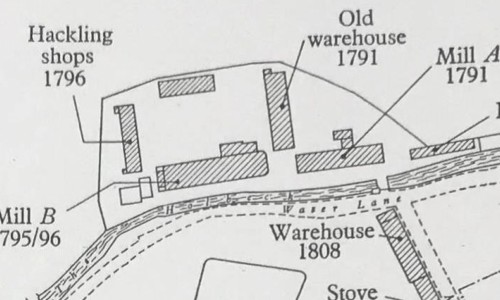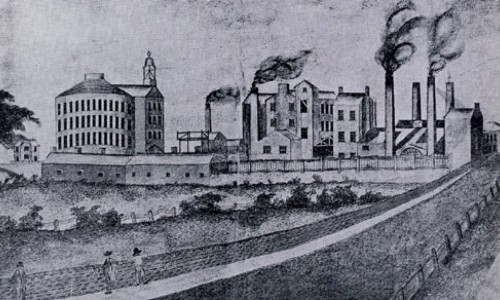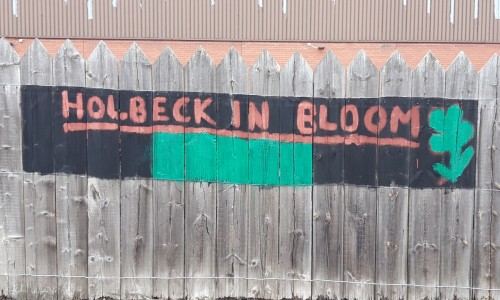Taking A Chance On Yourself; a story of young people beating the pandemic
November 30, 2020

There isn’t a social group, generational bracket or demographic sector that hasn’t been affected by the Coronavirus pandemic; by its very nature it has been indiscriminate and has not paused to be selective over who it holds in its grip. To some, it has caused some minor lifestyle shifts, to others it has caused a tidal wave of unforeseen tragedy. And there are lots of people in between; different people affected in different ways.
And one of them is a group of people who were already struggling with what life has dealt them, and whilst you could say that the pandemic is a great leveller in terms of treating everyone the same, it’s not always easy to think like that, and certainly to bounce back from it. So that’s when you need initiatives like the Forging Futures Campus to step in, and step up.
Work began five years ago by CEG to form what is now known as the Forging Futures Campus at Kirkstall Forge in Leeds, which provides a range of vocational training and work experience for students, local people and young people in the city, including some of the most vulnerable and hardest to engage with. CEG’s partnership with the Skill Mill and Leeds City Council is ground-breaking in helping young ex-offenders to move to a more positive stage in their lives.
When the Forging Futures Campus was set up, the main contractor (Wates) for the award-winning commercial building ‘Number One’ at Kirkstall Forge was a key partner, and alongside Leeds College of Building worked with young people to provide training opportunities on a fully operational construction site. Activity on the building naturally drew to a close upon its completion; but CEG was motivated to find a way to continue to provide training opportunities, but also to extend those opportunities to young people who didn’t yet know whether they wanted to work in construction, or, in truth, what to do next with their lives at all.
Aishah Donaldson is a 21-year-old who always wanted to work in beauty therapy, but life doesn’t always work out like that, and the journey she has taken to where she is today is a great example of the concept of taking opportunities and believing in yourself, particularly when all the odds are stacked against you.

(Photo credit: Forging Futures - Aishah Donaldson)
“I went to a careers advice service in Leeds,” Aishah explains “and I was sent on a Business admin work experience role. That was on a construction site, and afterwards I said ‘yeah I liked it in construction, I didn’t think I was going to find it so interesting but I did’. The lady mentioned that she had this course coming up, called Forging Futures.”
Ewan Metcalf is the director of IConsult Training who in partnership with CEG, run the Forging Futures programme. Aishah continues her story.
“So Ewan gave me a ring and said ‘we’re having an open day in a couple of days if you want to come down’. So I went down and I wouldn’t say I was the only girl, but I was the only ‘girly girl’ and I felt like ‘I don’t know what I’m doing here, I don’t think this is right’ but Ewan was like ‘you’ll find your place don’t worry’.”
The focus of Forging Futures has always been on helping a ‘lost generation’ of young people who, in reality, have always existed but who have struggled with the transition from school to work life and to varying degrees have fallen by the wayside. The Forging Futures course emboldened Aishah with confidence in her own qualities and put something concrete on her CV which opened up job opportunities straight away.
“Ewan went out of his way to find an opportunity for me to do some business admin in construction,” Aishah continues “so since I’ve finished the course I’ve found a full-time job, with a construction company (O’Connor Utilities Ltd). I was supposed to be going on some work experience but that fell through, but because the link was still there, when I applied for the role they saw on my CV that I’d been on the Forging Futures course and they decided to give me a go, so that gave me the opportunity to get my foot in the door. So it’s an annual salaried job, it’s not just a little part-time thing, it’s a full-time job. Although it’s a junior role for the moment, since I’ve been there I’ve been offered two opportunities to go higher up in my position and I’ve only been there since March, and obviously with COVID I had two months off……..”
Ah yes, COVID, the unspeakable hindrance to every facet of normality 2020 has to offer. But Aishah has prevailed during an uncertain period, mainly through her own qualities which had immediately left a mark on her new workplace and in a radically different and unknown environment.
“I did beauty training for two years,” Aishah explains “and then went on to do business studies, which I thought was the complete opposite, but this (working in construction) is the polar opposite to where I expected to be. When lockdown happened though, I was honestly quite worried with me not being there that long. I’d only been there three weeks before I got sent home, so I was worried that my job was hanging in the balance. But the skills I’ve picked up from Forging Futures and everything I did with Ewan, kind of allowed them to see that I’d been trained and could show those skills in my position, and they did actually let go a few people who had been there a couple of years and didn’t let me go. So I’d have been worried if I hadn’t done the course, I was starting completely from scratch and I didn’t know anything at all. But I had that knowledge behind me of the industry and I’m glad they kept me on.”
However the COVID-19 pandemic has subsequently affected you, I think everyone faced an initial period of other-worldly surrealism, despondency and uncertainty; a time when you needed something certain and reassuring to cling to. For some young people, the Forging Futures team were that rubber ring, and they remained open and available to talk to students past and present who suddenly didn’t know where to turn for a slice of positivity and structure.
Thank you @RachelReevesMP for your ongoing support @Lucinday & the amazing team @iconltd for getting the job done again 👏🏻👏🏻 The #digital campus In #Leeds launched this week
— ForgingFuturesCampus (@ForgeYourFuture) July 28, 2020
Changing lives & futures pic.twitter.com/StjaaTxDUy
(Labour MP for Leeds West Rachel Reeves congratulates Forging Futures on going digital)
Also, very quickly CEG and Forging Futures went digital, as a means of continuing the delivery of critical support to young people, and to continue to engage with, elevate and educate communities and young people in Leeds.
So CEG, with Ewan and the team – and with support from the boardroom and key personnel at CEG - set about building the same training, skills and employment modules and pathways, but to be delivered online, where they can can reach more people, you can change more lives, and you can do it quicker and more frequently.
The digital courses are presented through live delivery sessions where participants can interact, pre-recorded film, talks from industry experts and motivational talks from various people including the many ambassadors of the Forging Futures Campus. Much of the course structure and content has been put together with the help of former deputy leader of Leeds City Council, Lucinda Yeadon who had been appointed CEG’s full-time Community Liaison Manager in 2018 and is overseeing the Forging Futures Campus.
It was felt that this digital format was a direct and deliverable way to keep young people in touch with their guiding hand and their own communities, but also to continue with their work and educational support in a format as close as possible to what they had before.
Many young people have come back from furlough to be faced with redundancy, or maybe, as one of the cheaper options having been on the books for the least amount of time, they even received the dreaded call during furlough. This is a very real situation that Aishah faced, but her own skills and the tangible credentials of the Forging Futures course, saw her survive and now flourish. But this still leaves a lot more disillusioned young people wondering where to turn and faced with a stark jobs market and an economy in recession.
Aishah explains how Forging Futures has helped her character, given her the resilience to deal with setbacks and uncertain periods such as lockdown, and perhaps most significantly, has provided her with a career and life pathway which otherwise might have been a miscellany of short term positions and unsatisfactory fixes.
“Before I went to Forging Futures,” Aishah continues “I was looking at jobs which weren’t really something I was looking at as a full-time career, so I think without Forging Futures I’d now be in a part-time job where there’s not really any skills behind it almost. But because I’ve got that knowledge now and those two months getting everything behind me, it’s allowed me to get into a place where I actually want to be, rather than somewhere temporarily where I’m wasting time.”
At a time, post-education, where there is plenty of uncertainty already, it is easy for young people to feel alone, rudderless and misunderstood. Forging Futures was exactly the intervention Aishah needed.
“The most important lesson I’ve probably learnt is to believe in myself,” Aishah concludes “and to take opportunities that are presented to you. When I went to Forging Futures I looked around and saw everyone and I was like “eurgh, I don’t want to do this’. But Ewan talked me into it and I took a chance on myself, and it’s the best thing I’ve ever done. Because if I hadn’t, I wouldn’t be working in construction, I wouldn’t have done any training and I’d probably be somewhere struggling and that isn’t going to serve me well as a career. I thought I had it bad, but some of the guys on the course had been to some really, really horrible places to work and Forging Futures really encouraged them and taught them about self-worth.”
The digital campus created by Forging Futures is made up of 12 separate modules including construction training, resilience and determination, employability, careers advice, construction health and safety, CV writing and mock interviews and health and wellbeing.
Also, the aims and outcomes of the sessions remain the same; to empower people with skills and training, to educate on the social value in Leeds’s history, to understand where job opportunities are, to help build supportive relationships, to manage emotions, improve problem solving and to build confidence.
This is why we do what we do @KirkstallForge @TempleLeeds @ForgeYourFuture #leeds #youngpeople #jobs #skills
— IconLtd (@iconltd) August 26, 2020
To change lives & futures daily is a beautiful thing
Great to catch up with Tommy who graduated in May 2018 👏🏻👏🏻 pic.twitter.com/Wj0ODVT8P2
(Another Forging Futures graduate explains how he got into the construction industry)
In this respect, the digital format is also important in continuing a diverse representation of people in the delivery of classes and the messaging young people are receiving. But another important element of what Forging Futures delivers – hands-on work experience – can also still continue to some extent.
“There are also other contractors,” Ewan explains “who are able to offer limited work experience placements with whom we’ve built relationships. These are growing by the day as sites return to work and opportunities grow. CEG are also looking at helping local charities and organisations like Slung Low with volunteers. Whilst that work is not construction it’s all helping the City and will be important for young people’s development, confidence, sense of civic and personal pride and improving their skills.”
Doing positive deeds can be an enormous help in building or rebuilding a young person’s confidence, particularly at a time when feeling trapped and isolated can contribute to feeling ineffective and allow negative thoughts to fester.
An initial trial of the new digital programme has been delivered to 30 people at the Social Mobility Business Partnership and further trials are being conducted with MENCAP, some of the Forging Futures ambassadors and also via the Skill Mill programme.
Rolling the programme out will involve supporting vulnerable students from a few schools, housing associations and other local providers of services to young people and community groups. In November it is hoped to start face-to-face courses, or at least a ‘blended learning’ programme which combines both digital and classroom-based learning.
Forging Futures are taking some classes to Slung Low’s base at the Holbeck, where the upstairs concert room allows plenty of space for modules to be delivered in a socially distant environment, whilst also exposing the students to vital community work and supporting a fantastic local organisation.
So reacting to the unavoidable obstacles presented by COVID-19 has opened up a revised way for the Forging Futures mission to carry on, but also to find new ways in continuing to reach out to vulnerable young people, and perhaps more of them than in the real-world campus. And furthermore, it is an opportunity that is also future-proofed – against the possibility of any future COVID restrictions - and has now been opened up to all ages.
Whatever the future looks like, you can predict that there will still be vulnerable young people like Aishah Donaldson within it, looking for the kind of help Forging Futures is now set-up to provide in any circumstances. That future still needs resilience and a strength of recovery that isn’t always easy to find. Forging Futures is designed to convince confused and anxious people like Aishah that everyone has it, and it’s up to you to find it within yourself, and then to use it at the right time, to get you in the right place.
If anybody wants to learn more about Forging Futures and the new digital campus, please contact Lucinda Yeadon of CEG on Lucinda.Yeadon@ceg.co.uk

.jpg&w=500&h=300)






